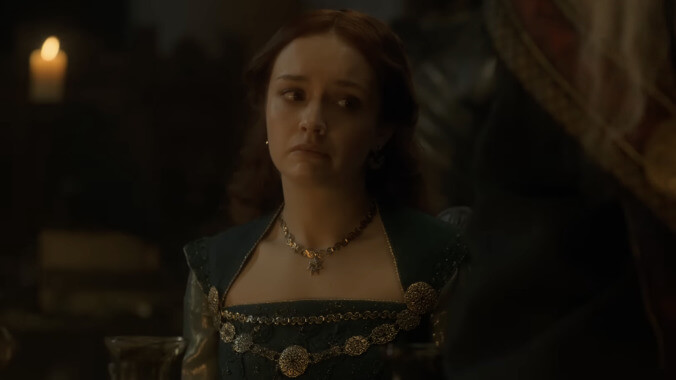In an interview with Entertainment Weekly, director Geeta Patel says she was cognizant of making Alicent feel multidimensional even at her worst moments, like confronting her son’s rape victim in the eighth episode. “It’s interesting how when we got to that scene, I was still concerned. I thought, ‘God, she cannot come across as a snake,’ And yet, what is she doing right now? Well, she’s paying off this girl to be quiet about being raped,” she reflects. “Olivia just blew it out of the water. She just was Alicent in the most vulnerable, powerful, dimensional, emotional way. We had such a great time shooting that scene.”
The episode offers clarity to a minor spoiler—and a new series edict—revealed by executive producer Sarah Hess earlier this year. “I’d like to clarify that we do not depict sexual violence in the show. We handle one instance off-screen, and instead show the aftermath and impact on the victim and the mother of the perpetrator,” Hess explained at the time. “I think what our show does, and what I’m proud of, is that we choose to focus on the violence against women that is inherent in a patriarchal system.”
“Both Sara and I are close and we talk about—just as I do with Ryan [Condal], actually—all these moments, and I think we all were on the same page. We wanted the realism to be present in all of these scenes—meaning, yes, being raped or being hurt sexually is a serious thing,” Patel adds now. “And then there’s the complication of the way society works during these times. Is it something that someone would call the police and to make a big deal out of, or is it something that just happened all the time? And going into that gray area, too, is quite interesting. So there was a lot of conversation, particularly around this scene and this part of the story.”
Many critics of the way Game Of Thrones has handled sexual violence have noted that the insistence on the “realism” of assault isn’t strictly necessary in a fantasy setting. But since Westeros is, for all intents and purposes, a violent patriarchy, it’s interesting to see the creative team acknowledge the world-building choices being made. Asking, “How does this society handle assault?” at least reveals something about this world beyond one character’s suffering—and in this case, it also reveals something about Alicent’s character.

